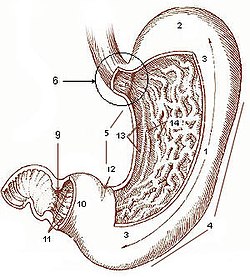Cardiac orifice
| Stomach | |
|---|---|

The stomach is located centre left in the human body.
|
|

1. Body of stomach 2. Fundus 3. Anterior wall 4. Greater curvature 5. Lesser curvature 6. Cardia 9. Pyloric sphincter 10. Pyloric antrum 11. Pyloric canal 12. Angular incisure 13. Gastric canal 14. Rugae
|
|
| Details | |
| Precursor | Foregut |
| System | Digestive system |
| Artery | Right gastric artery, left gastric artery, right gastro-omental artery, left gastro-omental artery, short gastric arteries |
| Vein | Right gastric vein, left gastric vein, right gastroepiploic vein, left gastroepiploic vein, short gastric veins |
| Nerve | Celiac ganglia, vagus nerve |
| Lymph | Celiac lymph nodes |
| Identifiers | |
| Latin | Ventriculus |
| Greek | Gaster |
| MeSH | A03.556.875.875 |
| Dorlands /Elsevier |
Stomach |
| TA | A05.5.01.001 |
| FMA | 7148 |
|
Anatomical terminology
[]
|
|
The stomach is a muscular, hollow, dilated part of the gastrointestinal tract that functions as a vital digestive organ. The stomach is present in humans and many other animals, including several invertebrates. In the digestive system the stomach is involved in the second phase of digestion, following mastication (chewing).
In humans and many other animals, the stomach is located between the oesophagus and the small intestine. It secretes digestive enzymes and gastric acid to aid in food digestion. The pyloric sphincter controls the passage of partially digested food (chyme) from the stomach into the duodenum where peristalsis takes over to move this through the rest of the intestines.
In humans the stomach lies between the oesophagus and the duodenum (the first part of the small intestine). It is in the left upper part of the abdominal cavity. The top of the stomach lies against the diaphragm. Lying behind the stomach is the pancreas. A large double fold of visceral peritoneum called the greater omentum hangs down from the greater curvature of the stomach. Two sphincters keep the contents of the stomach contained; the lower oesophageal sphincter (found in the cardiac region), at the junction of the oesophagus and stomach, and the pyloric sphincter at the junction of the stomach with the duodenum.
...
Wikipedia
